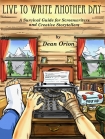Live To Write Another Day by Dean Orion (free ebooks for android .txt) 📕

Read free book «Live To Write Another Day by Dean Orion (free ebooks for android .txt) 📕» - read online or download for free at americanlibrarybooks.com
- Author: Dean Orion
Read book online «Live To Write Another Day by Dean Orion (free ebooks for android .txt) 📕». Author - Dean Orion
Everyone has different approaches to outlining. Some writers like to write very sparse outlines, providing just enough information to trigger the important elements of a scene in their mind when they write it later. Others like to deal with each scene in as much detail as they can up front. As you probably guessed, I’m in the second camp. I like to make tons of notes to myself right in the body of the outline and continue to flesh it out with as much background as I can. This often includes not just what is currently happening on the surface, but also the underlying thoughts, feelings, and motivations of the characters that drive each scene.
In other words, I continue to tune in the story, again, resisting the temptation to start turning it into a formal script for as long as possible, until it reaches the point that it’s so well worked out and bloated with information that the only thing left to do is flesh out the action and write the dialogue.
SURVIVAL GUIDE SUMMARY
5. Tuning In the Radio
Things to Remember:
•All original stories exist in a perfect state as thought forms that are separate from you. Listen and tune them in like a radio signal.
•Begin with research. This is the soundest foundation you can set for your process.
•By taking the time to build a foundation of research, crisis moments are less likely to occur.
•Be a passive channel of information while you research, taking lots of notes without editing yourself. Let the ideas flow without judgment.
•Transcribe your notes at the end of your research period. Creating this Notes Document allows you to kick off your project without ever having to stare at a blank page.
•Create a Concept Document from your Notes Document. Avoid the temptation to rush into the outline or the first draft.
•Structure your story by writing the scenes on index cards or a whiteboard so you can view them as separate moments, rearranging them as necessary.
•Begin your outline by writing down all the scenes you have so far. Get all your ideas on the table without worrying about getting the story right. Your process will naturally fill in the blanks.
•Describe the scenes in your outline without actually writing them. Your outline is a road map, not the final product.
•Note deeper character motivations and other important story points in your outline. The deeper you dig, the more material you will have to work with.
•Once you’ve figured out most of your story structure, write all the scenes down on one or two pages of a legal pad, using one line for each scene, then skim the story to see if it flows.
Questions to Ask Yourself:
•What is the backdrop of your story and how can you learn more about it?
•Which websites will tell you more about your story’s larger world and help you develop important details about your characters? Identify and print relevant materials. Bookmark the sites for future reference.
•Which books are available that will educate you about your story’s world and its characters?
•Do you know anyone who is an expert in a field that will help you tell your story? If so, arrange to interview them and record their answers.
•How would you describe your story to someone in just a sentence or two? (Logline)
•What are you trying to say with this story? (Theme)
•What does the voice of the piece sound like? (Tone)
•Who inhabits this world? What are their backgrounds, flaws, hopes, and dreams? What compels them to do what they do? (Characters)
•What is your basic story? (Story Summary)
•What previously published or produced works are close in genre, tone, and structure to your story? Make a list, then study and breakdown those works.
6. This Draft’s for You
Hallelujah! It’s time to start writing. This is where all the hard work and patience in the beginning of the process finally pays off. Now that you’ve taken the time to research the subject of your story, clearly articulated what you want to say, and fully understand who your characters are, you can really begin to play and have fun within the world you’ve created. Even more importantly, because you’ve constructed an outline that’s so rich in detail and depth that it’s essentially a rough draft, you also don’t have to worry that the whole damn thing will fall apart. In other words, you’ve successfully tuned in the radio and conceived this idea, this “child of your mind.” Now its cells are starting to multiply!
To me, this is the most sacred part of the writing process, which is why I believe it’s critical that you don’t tell anyone—not a single soul—about this child that you’re now carrying. Why?
Because this draft’s for you.
Think about it. If you are essentially this story’s “mother,” if you’re the one who’s going to be charged with nurturing it, with protecting it, with being the best possible vessel you can be for it (for God-only-knows how many months or years), then damn it, why should you share it now, when it’s so rife with possibilities and endless potential? What’s the hurry? Why not take this opportunity to savor it a little bit before you expose it to the harsh, cruel world?
Like any expectant mother, you know it’s going to be tough. You know there are going to be mornings when you don’t feel so well, afternoons when you’re going to pass out for





Comments (0)